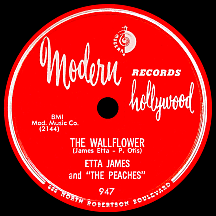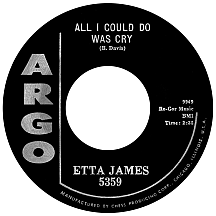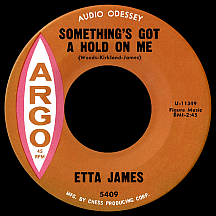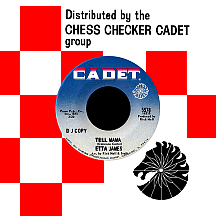ETTA JAMES
For a time it seemed Etta James was never going to get her due. Etta, the fabulous singer with God-given pipes enabling her to take on just about any type of song. Etta, as much at home with gospel and blues as she was with romantic pop standards. Etta, a star of the 1960s who still somehow flew below most people's radar. In the 1970s and 1980s it was difficult to find anyone beyond those really obsessed fans of soul or blues who'd even heard of her. I've experienced first-hand the frustration of trying to expose her exceptional music when I hosted a number of specialty radio shows and programmed an oldies format; she was one of those artists the so-called "experts" didn't recommend as suitable for airplay (I was roundly criticized on a couple of occasions for playing her music - clueless people begone!) and the resultant lack of exposure left her in a sort of airplay limbo. It didn't help that, unbeknownst to me, she had an ongoing struggle with drug addiction that plagued her for decades.
But then a remarkable thing happened; public perception changed and her career was reset. A newfound appreciation for her work, fueled by a series of revelatory blues albums starting the the late-'70s, made her name a more familiar one by the time the 1990s had gotten under way. Then came the clincher: "At Last," her 1961 hit version of an old standard, entered mainstream pop culture through exposure in movies, TV shows, commercials, sporting events and more; it suddenly became one of the most recognizable musical recordings of the new millennium (despite its vintage) and her profile rose with it to place her among the superstars of the early 21st century. A wrong had been righted. Ready or not, Etta James was in demand and more popular than ever.
An unwed 14-year-old, Dorothy Hawkins, gave birth to Jamesetta Hawkins in Los Angeles in 1938. Though it can never be truly verified, Jamesetta's father, according to relatives and friends close to her mother at the time, was Rudolf Wanderone, a white pool shark who later adopted the name "Minnesota Fats" after the fictional character of the same name in the 1959 book and 1961 movie The Hustler. Dorothy, too young for the responsibiliy and unreliable at best, passed the care of her child to various relatives until Jesse and Lula Rogers became unofficial guardians and raised her through the age of 12. When "Mama Lula" (as she called her) passed away in 1950, Jamesetta moved to San Francisco and reunited with her birth mother.
As a teenager she formed a group with two friends, sisters Abbye and Jean Mitchell. They called themselves The Creolettes and sang together at events around town. During a Bay Area concert stop, Johnny Otis saw them perform and there was something in Jamesetta's vocal style that intrigued him. Unlike many young girls who idolized the top female singers, her driving force came primarily from the likes of Ray Charles and Guitar Slim (who was hot in 1954 with "The Things That I Used to Do"). It was this more rugged, commanding influence, harnessed so well by the singer at just 15 years of age, that convinced Otis to offer the trio a recording deal. With approval from Dorothy and the Mitchell girls' parents, Johnny had them flown to Los Angeles for a session at the studios of Modern Records, the label owned by Lester Bihari and his three brothers. Otis made some changes: he flipped Jamesetta's name to Etta James, while the group was called The Peaches after her nickname, "Miss Peaches," acquired during childhood because of her lighter-skinned complexion.
"The Wallflower," an answer to The Midnighters' chart-topping "Work With Me Annie," was recorded at that first session (originally "Roll With Me Henry," they changed the title to avoid any controversy over the suggestive subject matter, though the lyrics remained intact). Etta and Johnny claimed writing credit, though the girls had been singing the tune in public before Otis discovered them and it's likely the Mitchell sisters were involved in the song's admittedly derivative creation. To give the track an added element not heard on the Midnighters original, Richard Berry was called in and the song became a duet, though Berry went uncredited and the sisters were relegated to 'oooh-oooh' backing vocals. A number one airplay smash, "The Wallflower" reached number two on the R&B best seller charts in March 1955 while a sterilized cover version by Georgia Gibbs, renamed "Dance With Me Henry (Wallflower)," rode high on the pop charts, winding up as a million seller (much as Gibbs had done a few months earlier with LaVern Baker's "Tweedlee Dee").
Hank Ballard and his Midnighters had played along with the gag, hitting the R&B charts that summer with their own answer to the answer, "Henry's Got Flat Feet," but Etta's next chapter in the saga, "Hey! Henry" (with label credit to Richard Berry as "Henry") proved to be one too many and didn't sell. Maxwell Davis, the producer and bandleader on most of Etta's Modern sessions, gave the third single a bigger band sound; "Good Rockin' Daddy" (cowritten by Berry and Joe Josea, a pseudonym of Joe Bihari) set Etta's come-hither vocals front-and-center, though The Dreamers (which included Jesse Belvin shortly before he went solo) replaced the Peaches on backing vocals (they were phased out rather quickly, in fact, as Etta was the only one Otis and the Biharis were really interested in). The single returned her to the national charts late in the year.
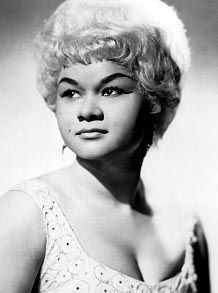
Starting in 1956, I.D. on the record labels went to Etta "Miss Peaches" James. She traveled to New Orleans to make some recordings at Cosimo Matassa's studio where Fats Domino had pounded out so many classics. Working with many of the best local session musicians (Lee Allen, Harold Battiste, Earl Palmer), her self-penned "Tough Lover" displayed a forceful eroticism (channeling Little Richard a bit in the process), leaving little doubt as to her top priority. Despite all the positive energy, her later efforts sparked little radio airplay or sales. By the time she made her final recordings for Modern, Harvey Fuqua (leader of The Moonglows) had come into her life, personally and professionally, and he had other ideas about the direction her career should take.
There were two 1958 singles on Kent (a new Modern label imprint) including "I Hope You're Satisfied," a strong duet by Etta and Harvey under the names Betty and Dupree (lifted from the title of Chuck Willis's great hit tune), after which she was free from her contract with Modern. Fuqua hooked her up with Leonard Chess at another family-owned label, Chicago's Chess Records, where she started out doing backing vocals (she's on Chuck Berry's hits "Almost Grown" and "Back in the U.S.A."). But with "All I Could Was Cry," written by Gwen Gordy, Roquel "Billy" Davis and Motown founder Berry Gordy, she began a nonstop string of hits lasting four years; her emotional intensity on the track connected immediately, landing her in the pop top 40 and at number two R&B in the spring of 1960. A fabulous Etta and Harvey duet, "If I Can't Have You," came on its heels straight into the R&B top ten, their first of two hits together that year (Willie Dixon's "Spoonful," recorded by Howlin' Wolf around the same time, was the other). "My Dearest Darling," a ballad composed by hitmaking bandleader Paul Gayten and pianist-singer Eddie Bo, was a hit in the fall and gave just a hint of the direction Etta (at the urging of Leonard Chess) would be taking in the near future.
When the Grammy nominations for 1960 were announced, "All I Could Do Was Cry" appeared in the overstuffed category Best Rhythm and Blues Performance, competing with seven others. The following year she repeated in the category with "Fool That I Am," though two singles in between were of greater significance. The first, "At Last," wasn't instantly established as Etta's signature song; that came after many years. But it was a huge R&B hit at the time (number two in early '61) despite a weaker showing at top 40 radio. Composed by Mack Gordon and Harry Warren and introduced by Glenn Miller in the 1942 film Orchestra Wives, the song was destined, in the long run, to be most closely identified with Miss Peaches. "Trust in Me," a 1937 hit for Mildred Bailey remade by countless others, took on a new vibrancy with Etta's anguished, and brilliant, performance, landing her in the pop top 30 in April 1961. Billy Davis's "Seven Day Fool," an infectious uptempo number with strings, made little impact at the time but has rightfully become a fan favorite.
The hit ballads pegged her somewhat as a jazz singer, a not entirely inaccurate assessment, but at some point Etta had to let 'er rip. Working with producer Ralph Bass, she committed some hot R&B sides to wax, foremost among them "Something's Got a Hold on Me," a sexy gospel-infused song (if there technically is such a thing) she'd written with Pearl Woods and Leroy Kirkland. It was a spring '62 hit, followed by the summer hit "Stop the Wedding" (penned by Pearl and Leroy with Freddy Johnson), a "love triangle" tune with the singer as odd woman out (a theme she broached many times in her music...and, occasionally, in her own real-life romantic entanglements).
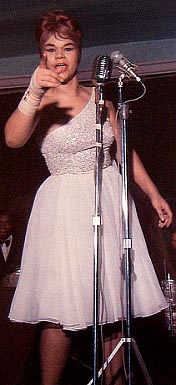
Though on a roll as a singer, success seemed to bring out the worst in Etta's personal life. She admitted to being a "wild woman" and couldn't seem to avoid spiraling out of control once those greenbacks were bulging in her purse. Developing a dependency on alcohol and, more seriously, hard drugs, she went through several rounds of rehab over the years, never quite able to make it stick until her later years of life. The evidence was even on display for anyone with a keen eye; on the cover of her album Etta James Rocks the House, recorded live in September 1963 at the New Era Club in Nashville with guitarist David T. Walker and his band, her right arm is bandaged to hide needle marks. In a way this may have given her a hard-knock pedigree of sorts, suggesting she led the kind of turbulent life required of a bona fide blues singer; she certainly delivered the goods that particular smoke-filled evening in Tennessee.
The hit streak continued in 1963. "Pushover" (penned by Billy Davis and soon-to-be Chess hitmaker Tony Clarke) had more of a mainstream girl group sound and was one of her biggest hits; "Pay Back" and "Two Sides (To Every Story)" succeed along the same lines and are, quite simply, great. Her live take (from Rocks the House) on Jimmy Reed's "Baby What You Want Me To Do" was her strongest single of 1964, but at this point, with trends moving towards invading British acts and the Motown sound, James was nearly a no-show on the charts for the next three years. The exceptions were a pair of killer soul sister duets with a San Fran friend from childhood, Sugar Pie DeSanto; "Do I Make Myself Clear" and "In the Basement" made a little noise in late '65 and early '66. At this time, Argo Records took on a new name, Cadet, and she remained on this imprint until being switched to the Chess parent label in the early 1970s.
By 1967, her career needed a shot in the arm (I admit that's a tasteless pun) and Chess sent her to the latest soul music hot spot, Muscle Shoals, Alabama, home of Rick Hall's FAME Studio, where she recorded enough tracks for two albums. Clarence Carter's "Tell Mama," with an audacious vocal from Etta and an arrangement as electrifying as anything on the radio at the time, was from those sessions and became the biggest pop hit of her career near year's end. The follow-up, "Security," succeeded in giving the song a female spin on par with Otis Redding's original and hit the top 40 a few months later. She received her third and fourth Grammy noms for these tracks in adjacent years, competing, but still not winning, in the expanded category Best Rhythm and Blues Solo Vocal Performance, Female.
Etta's seesawing drug habit threatened to take her down for good on a few occasions, but she always came back, seemingly stronger (in voice, at least) than ever. The October 1969 death of Leonard Chess, such a positive force in her life over nearly a decade, was a devastating personal blow. Her ties to Chess Records were strong (for obvious reasons) and she continued recording for the company until 1976, though the hits had stopped a few years earlier as she detoured into further rehab facilities (one stay lasted more than a year).
A move to Warner Bros. didn't last, but it worked out for the best, as her association with a number of independent labels has proven to be the better route taken. A big break came when she opened for The Rolling Stones (they were longtime fans) on some of their 1978 tour dates, as she gradually established herself as one of the premier blues singers of the 1980s and '90s while eventually finding a way to leave those old substance habits behind for good. In 1995 the elusive Grammy was hers at last, to be followed by two more in the years to come. Then, thanks to that unexpected spark of media exposure, "At Last" kicked in and made her a household name. I'm so freakin' glad it happened, as far too many of the great singers of five, six or seven decades ago seem to have been lost in the shuffle. Etta James, at least, won't be forgotten.
NOTABLE SINGLES:
- The Wallflower - 1955
by Etta James and "The Peaches" - Hey! Henry - 1955
- Good Rockin' Daddy - 1955
- Tough Lover - 1956
as Etta "Miss Peaches" James - I Hope You're Satisfied - 1958
by Betty and Dupree - All I Could Do Was Cry - 1960
- If I Can't Have You - 1960
by Etta and Harvey - My Dearest Darling - 1960
- Spoonful - 1960
by Etta and Harvey - At Last - 1961
- Trust in Me - 1961
- Fool That I Am /
Dream - 1961 - Don't Cry, Baby /
Sunday Kind of Love - 1961 - It's Too Soon to Know /
Seven Day Fool - 1961 - Something's Got a Hold on Me /
Waiting for Charlie to Come Home - 1962 - Stop the Wedding - 1962
- Next Door to the Blues /
Fools Rush In - 1962 - Would it Make Any Difference to You /
How Do You Talk to An Angel - 1963 - Pushover - 1963
- Pay Back - 1963
- Two Sides (To Every Story) /
I Worry Bout You - 1963 - Baby What You Want Me To Do - 1964
- Loving You More Every Day - 1964
- Do I Make Myself Clear - 1965
by Etta James and Sugar Pie DeSanto - In the Basement - 1966
by Etta James and Sugar Pie DeSanto - I Prefer You - 1967
- Tell Mama /
I'd Rather Go Blind - 1967 - Security - 1968
- I Got You Babe - 1968
- You Got It - 1968
- Almost Persuaded - 1969
- Losers Weepers - 1970
- I Found a Love - 1972
- All the Way Down - 1973


